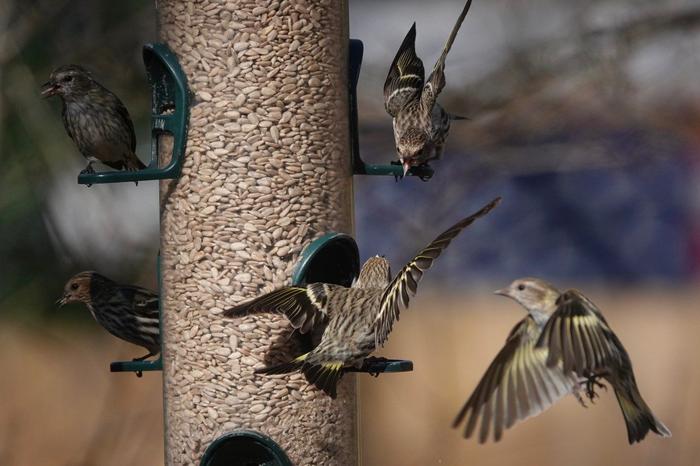Ashley Dayer hopes to peck away at the notion that bird feeding is simply for the birds.

Credit: Photo courtesy of Richard Hall.
Ashley Dayer hopes to peck away at the notion that bird feeding is simply for the birds.
Associate professor in the Department of Fish and Wildlife Conservation at Virginia Tech, Dayer is the lead author of an article published in People and Nature that argues not only for the acknowledgment of the activity’s benefit to humans, but that it should play a role in public guidance and policy.
“Wildlife agencies and others making decisions on managing bird feeding need to be considering not only what the science is behind what’s going on with birds, but also the science behind what’s going on with people,” Dayer said.
The article also encourages additional research to better understand how human well-being is impacted by regularly feeding birds, and Dayer and a team of researchers both in and outside of Virginia Tech are leading the way. The group is conducting what is perhaps the first large-scale bird feeding research that also incorporates observing humans.
“People are not only reporting what they see at their bird feeders, but also their emotional responses to it,” Dayer said. “It’s pretty fun because most citizen science projects focus just on the natural or physical science, but we’re now able to look at the human piece of it.”
Funded recently as part of a more than $1.5 million National Science Foundation grant led by Dayer and Dana Hawley, professor of biological sciences, the four-year project aims to engage more than 10,000 bird feeders across the United States.
Other collaborators on the article and project include
- Christy Pototsky, a graduate student studying fish and wildlife conservation at Virginia Tech
- Richard Hall, associate professor at the University of Georgia
- Alia Dietsch, associate professor at Ohio State University
- Tina Phillips, David Bonter, Emma Greig, and Wesley Hochachka of the Cornell Lab of Ornithology
Dayer said interest in the topic began in 2021, when the researchers began to notice state agencies advising people to stop feeding birds in response to various avian disease outbreaks. After looking into it, they found that 23 states had made such recommendations without evidence it would decrease disease spread, with varying levels of pushback, and with no real method of gauging compliance, much less its impact on people.
The new project is an extension of the work Dayer and Hawley began about six years ago with the help of a joint seed grant from the Global Change Center of the Fralin Life Sciences Institute and the Institute for Society, Culture, and the Environment.
Hawley said the lack of information about humans related to bird feeing was something she’d not previously considered, and she found it a strong motivator for this project.
“In all my years of studying how bird feeding impacts wild birds, I didn’t give much thought to how it can also impact the people that spend their time and money feeding and watching birds,” Hawley said. “I get calls every year from people who see a sick bird at their feeder and want to know how they can help prevent disease spread. All in all, this made me wonder about how policy decisions that aim to minimize disease spread can inadvertently impact the people who feed the birds.”
To help find those answers, the research team will utilize Project FeederWatch’s existing network of bird enthusiasts. Operated by the Cornell Lab of Ornithology and Birds Canada, FeederWatch has tasked people with asks participants to observe and report what they see at their feeders from November to April for the past 37 years.
“FeederWatch is such a versatile data set even though, at its core, it is based on simple bird counts,” said Emma Greig, co-author and project leader for FeederWatch. “When you overlay information about behavior, disease, habitat, and climate change with those bird counts, we can get amazing insights into ecology and evolution.”
During this project, FeederWatch participants also will be asked to observe their own well-being. Dayer said about 8,000 submissions came in in from the first week of this season alone.
Such passion for birds is something Dayer understands very well. She said her mother always made sure they had bird feeders outside their family’s home, and when she became an “empty nester,” the birds became almost like children.
“She’ll go on vacation and cut the vacation short because she needs to go home and feed her birds,” Dayer said. “So I’ve lived with someone who was really into bird feeding and have seen how important it can be to them.”
But Dayer believes the positive impact of bird feeding isn’t limited to enthusiasts and is important in proving one of the most widely accessible connection to wildlife.
“People in urban areas can feed birds. People with just a deck can feed birds. People with a wide range of physical abilities can feed birds. So it’s just a great way to keep that human connection to wildlife,” Dayer said.
Hawley agreed with that sentiment, and said she hopes their work helps advance policies that will foster both health and healthy relationships.
“In a world where so many of us live in cities or suburbs, having birds visit feeders in our yards or on our balconies is one of the only ways we get to connect daily with wildlife. But people want to be able to feed birds in ways that keep wild bird populations healthy and thriving,” Hawley said. “Our work will ideally help us develop guidelines for bird feeding that minimize risk to wild birds and maximize the benefits to the people that feed them.”
The Department of Fish and Wildlife Conservation is in the College of Natural Resources and Environment. The Department of Biological Sciences is in the College of Science.
Journal
People and Nature
Article Publication Date
5-Dec-2023




